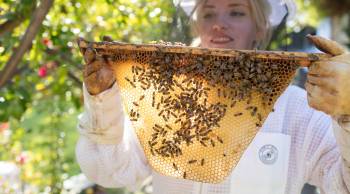TEXT OF INTERVIEW
Kai Ryssdal: Douglas Coupland hit the collective consciousness almost 20 years ago with his first novel “Generation X.” Besides getting him credit for naming a whole generation that book started Coupland on a career in which he’s made a habit of writing about our relationship with technology. In a way his newest novel “Generation A” comes full circle. Taking us through a world in which bees are extinct and interpersonal communication is a dying art. Welcome to the program.
Douglas Coupland: Pleasure, thank you.
Ryssdal: You have somehow commingled the death of bees, bees are non-existent in this book, with the death of communication and conversation between people. What inspired that?
Coupland: I remember the first time, I heard about bees having the colony collapse disorder, syndrome, and I just about wanted to vomit. It was such a frightening thing to even consider. And at the time when people began to notice that colonies were leaving home and never coming back, it was postulated that it was cell phones that were causing it, the cell phone towers and the waves. And I thought to myself, oh boy, Doug, you’re a human being, you know your species, if people had to choose between bees or cell phones, what would they choose? And everybody would probably say, oh, bees, of course, but then they would be secretly off in the garage or the stairwell making cell phone calls. And that got me confused and worried about communication and what it does to us.
Ryssdal: I wonder if you’d read a little bit of this book for us, since this is a book of characters telling stories. Go to the one by your character Samantha, I’m on page 203 here, it’s called “The Anti-Ghosts.”
Coupland: Her story goes there was once a group of people whose souls had been warped and damaged and squeezed dry by the modern world. One day their souls rebelled altogether and fled the bodies that had contained them. And once a soul leaves a body it’s all over, there’s no going back. The thing is the bodies that had created the souls remained alive and continued their everyday activities, such as balancing checkbooks, repairing screen doors, and comparison shopping for white, terry-cotton socks at the mall, while their souls met in small groups at the intersection of roads confirming with each other that what had happened was real and it was. And that they hadn’t all turned clueless at once. So are we ghosts? Well, I don’t think so because the bodies we came from are still alive. Well, are we monsters then? No, because monsters can interact with the world and all we can do is drift around, and pass through walls and live a life of perpetual mourning. Well, then are we the undead? No, we’re not, but we sure aren’t alive either.
Ryssdal: I don’t want to negatively impact your Amazon ratings too much, but this was a very, not an uplifting book, I thought.
Coupland: There is hope at the end of it.
Ryssdal: Yeah, there is.
Coupland: I’m not a pessimist. I’m not a Pollyanna. I’m kind of realistic about human behavior. I think that in the end we’re 50 percent plus one more to the good than we are to the bad. But I do worry about people a lot, actually.
Ryssdal: Does technology, modern technology as we know it, help us with that or does it make us less able to deal with figuring out what people are?
Coupland: I think we’ve just had to absorb too much too quickly. I’ve asked people who are much older than myself, I’m 47, which seemed more startling at the time, the introduction of television or the introduction of the Internet. And everybody goes slamdunk the Internet. I remember the 70s that all we really did in society is we went from rotary phones to bush-button phones, and that was it for the decade. And then the 80s came and we had music videos. And then the 90s and the Internet. We have absorbed so much in the last, not even five years, three years, it’s crazy. It’s almost like we want a year out to absorb it all, but we can’t. And it’s probably going to get thicker and faster. And again, that’s where stories come in, it’s a way of finding new ways of looking at ourselves, and finding new ways of surviving psychically during all this change and turmoil.
Ryssdal: Douglas Coupland. His new book is called “Generation A.” Thanks very much for your time.
Coupland: Kai, it’s been a pleasure. Thank you.
There’s a lot happening in the world. Through it all, Marketplace is here for you.
You rely on Marketplace to break down the world’s events and tell you how it affects you in a fact-based, approachable way. We rely on your financial support to keep making that possible.
Your donation today powers the independent journalism that you rely on. For just $5/month, you can help sustain Marketplace so we can keep reporting on the things that matter to you.

















